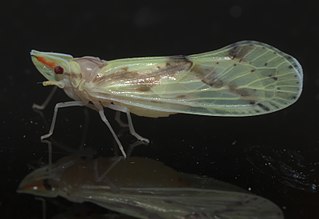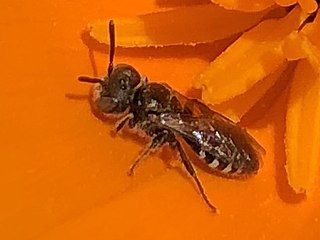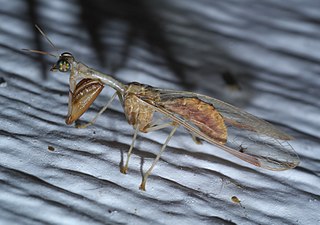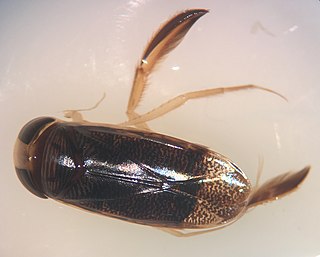
The Japanese angelfish or Japanese pygmy angelfish, is a species of marine ray-finned fish, a marine angelfish belonging to the family Pomacanthidae. It is found in the western Pacific Ocean.

Iresine is a genus of flowering plants in the family Amaranthaceae. It contains 20 to 25 species, all of which are native to the American tropics. The generic name is derived from the Greek word εerios), meaning "wooly", referring to the trichome-covered flowers. Bloodleaf is a common name for those species that have colored foliage, and these are often cultivated as ornamental plants. Some species are additives to versions of the hallucinogenic drink ayahuasca.

Perigonia lusca, the half-blind sphinx or coffee sphinx, is a moth of the family Sphingidae. It was first described by Johan Christian Fabricius in 1777.

Mycena interrupta is a species of mushroom. It has a Gondwanan distribution pattern, being found in Australia, New Zealand, New Caledonia and Chile. In Australia, it is found in Victoria, Tasmania, New South Wales, South Australia, and Queensland, where its distribution is limited to Lamington National Park.

Chrysomela is a genus of leaf beetles found almost throughout the world, but not in Australia. It contains around 40 species, including 7 in eastern and northern Europe. It also includes at least 17 species in North America, including the cottonwood leaf beetle Chrysomela scripta.
Allocnemis interrupta is a species of white-legged damselfly in the family Platycnemididae.
Loweina interrupta is a species of lanternfish.
Stelis interrupta is a species of cuckoo bee in the family Megachilidae. It is found in North America.

Trachusa is a genus of leafcutter, mason, and resin bees in the family Megachilidae. There are at least 50 described species in Trachusa.

Otiocerus is a genus of derbid planthoppers in the family Derbidae. There are about 16 described species in Otiocerus.
Brachymelecta interrupta is a species of digger-cuckoo bee in the family Apidae, found in Central America and North America.

Brachymelecta is a genus of cuckoo bees in the family Apidae, formerly known by the name Xeromelecta.

Perdita interrupta is a species of bee in the family Andrenidae. It is found in North America.

Chrysomela interrupta, the alder leaf beetle, is a species of leaf beetle in the family Chrysomelidae. It is found in North America.
Rhagodera is a genus of cylindrical bark beetles in the family Zopheridae. There are at least four described species in Rhagodera.

Dicromantispa interrupta is a species of mantidfly in the family Mantispidae. It is found in Central America and North America. Larvae develop in the egg sacs of hunting spiders. Adults have spotted wings.

Triorla is a genus of robber flies in the family Asilidae. There are about five described species in Triorla.

Myzia interrupta, the broken-dashed ladybeetle, is a species of lady beetle in the family Coccinellidae. It is found in North America.
Sobarocephala interrupta is a species of fly in the family Clusiidae.

Hesperocorixa interrupta is a species of water boatman in the family Corixidae. It is found in North America.
















